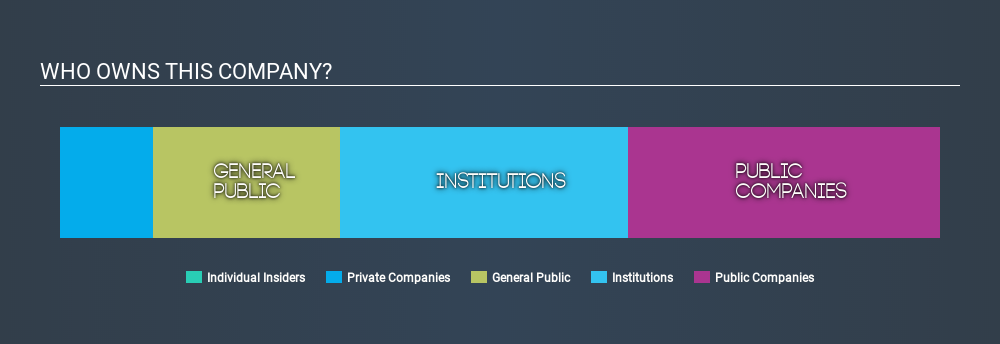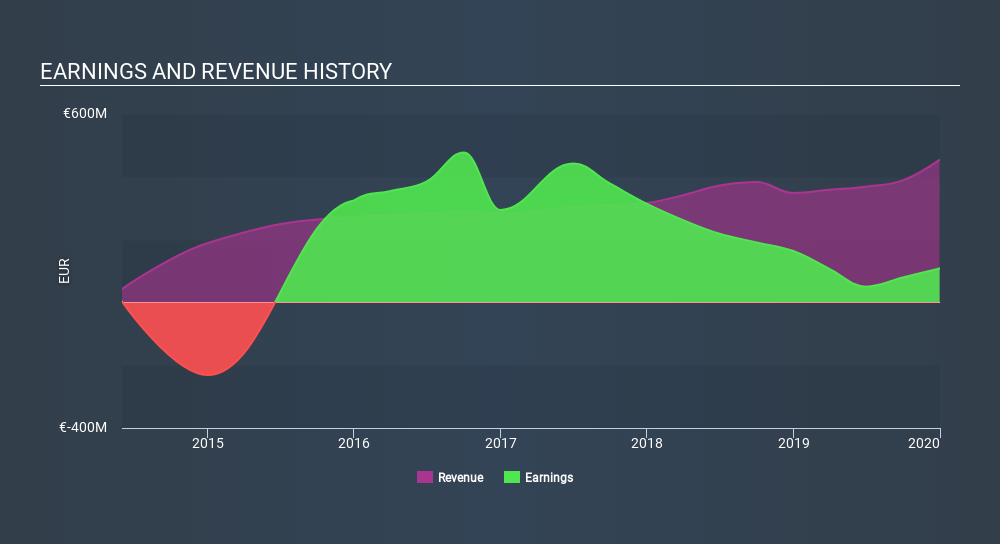- France
- /
- Retail REITs
- /
- ENXTPA:CARM
Could Carmila S.A.'s (EPA:CARM) Investor Composition Influence The Stock Price?

If you want to know who really controls Carmila S.A. (EPA:CARM), then you'll have to look at the makeup of its share registry. Institutions will often hold stock in bigger companies, and we expect to see insiders owning a noticeable percentage of the smaller ones. Companies that used to be publicly owned tend to have lower insider ownership.
Carmila has a market capitalization of €2.2b, so we would expect some institutional investors to have noticed the stock. Our analysis of the ownership of the company, below, shows that institutions own shares in the company. Let's delve deeper into each type of owner, to discover more about Carmila.
Check out our latest analysis for Carmila

What Does The Institutional Ownership Tell Us About Carmila?
Many institutions measure their performance against an index that approximates the local market. So they usually pay more attention to companies that are included in major indices.
Carmila already has institutions on the share registry. Indeed, they own 33% of the company. This suggests some credibility amongst professional investors. But we can't rely on that fact alone, since institutions make bad investments sometimes, just like everyone does. If multiple institutions change their view on a stock at the same time, you could see the share price drop fast. It's therefore worth looking at Carmila's earnings history, below. Of course, the future is what really matters.

We note that hedge funds don't have a meaningful investment in Carmila. The company's largest shareholder is Carrefour SA, with ownership of 35%, Next, we have Fédération Nationale du Crédit Agricole and BNP Paribas, Private & Investment Banking Investments as the second and third largest shareholders, holding 9.2% and 8.8%, of the shares outstanding, respectively.
Further, we found that the top 3 shareholders have a combined ownership of 53% in the company, meaning that they are powerful enough to influence the decisions of the company.
While it makes sense to study institutional ownership data for a company, it also makes sense to study analyst sentiments to know which way the wind is blowing. There are a reasonable number of analysts covering the stock, so it might be useful to find out their aggregate view on the future.
Insider Ownership Of Carmila
The definition of an insider can differ slightly between different countries, but members of the board of directors always count. The company management answer to the board; and the latter should represent the interests of shareholders. Notably, sometimes top-level managers are on the board, themselves.
Insider ownership is positive when it signals leadership are thinking like the true owners of the company. However, high insider ownership can also give immense power to a small group within the company. This can be negative in some circumstances.
Our data suggests that insiders own under 1% of Carmila S.A. in their own names. But they may have an indirect interest through a corporate structure that we haven't picked up on. It is a pretty big company, so it would be possible for board members to own a meaningful interest in the company, without owning much of a proportional interest. In this case, they own around €1.6m worth of shares (at current prices). Arguably, recent buying and selling is just as important to consider. You can click here to see if insiders have been buying or selling.
General Public Ownership
The general public, with a 21% stake in the company, will not easily be ignored. While this group can't necessarily call the shots, it can certainly have a real influence on how the company is run.
Private Company Ownership
Our data indicates that Private Companies hold 11%, of the company's shares. Private companies may be related parties. Sometimes insiders have an interest in a public company through a holding in a private company, rather than in their own capacity as an individual. While it's hard to draw any broad stroke conclusions, it is worth noting as an area for further research.
Public Company Ownership
It appears to us that public companies own 35% of CARM. It's hard to say for sure, but this suggests they have entwined business interests. This might be a strategic stake, so it's worth watching this space for changes in ownership.
Next Steps:
I find it very interesting to look at who exactly owns a company. But to truly gain insight, we need to consider other information, too. For example, we've discovered 4 warning signs for Carmila (1 doesn't sit too well with us!) that you should be aware of before investing here.
If you are like me, you may want to think about whether this company will grow or shrink. Luckily, you can check this free report showing analyst forecasts for its future.
NB: Figures in this article are calculated using data from the last twelve months, which refer to the 12-month period ending on the last date of the month the financial statement is dated. This may not be consistent with full year annual report figures.
If you spot an error that warrants correction, please contact the editor at editorial-team@simplywallst.com. This article by Simply Wall St is general in nature. It does not constitute a recommendation to buy or sell any stock, and does not take account of your objectives, or your financial situation. Simply Wall St has no position in the stocks mentioned.
We aim to bring you long-term focused research analysis driven by fundamental data. Note that our analysis may not factor in the latest price-sensitive company announcements or qualitative material. Thank you for reading.
About ENXTPA:CARM
Carmila
As the third-largest listed owner of commercial property in Europe, Carmila was founded by Carrefour and large institutional investors in order to enhance the value of shopping centres adjoining Carrefour hypermarkets in France, Spain and Italy.
Undervalued with proven track record and pays a dividend.
Similar Companies
Market Insights
Community Narratives



